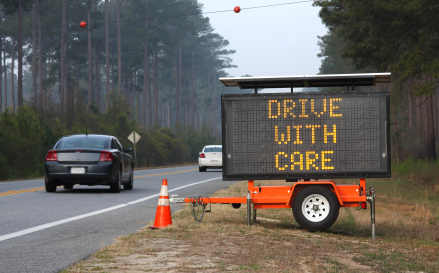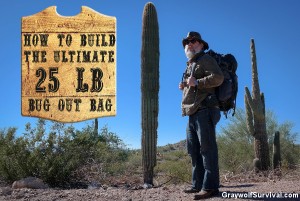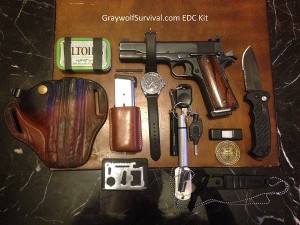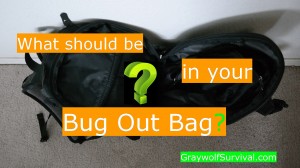
One of the most dangerous things you can do in life is travel. Not just traveling as in backpacking through Europe (which would be super cool), but all sorts of traveling. With proper planning and understanding, you can make it less of a risk. I’ve done a LOT of traveling over the years, throughout all of the U.S. and several countries – sometimes traveling for weeks through jungles or deserts.
Unless you have an awesome homestead in the middle of Alaska where you grow your own food and don’t have a job outside of your property, you’ll most likely be traveling in your local area quite often to go to work or buy groceries or other supplies. This is typically the least dangerous kind of travel but because you do it so often, there’s still a decent chance things can go wrong. Traveling even farther can be even more dangerous. So what can go wrong? Let’s look at a few examples to get your creative juices flowing.
Driving
Your car breaking down could be a direct threat to you if something happens like your tire falling off. More likely though, the danger of breaking down comes from you now being exposed to other dangers that weren’t a problem as you were speeding down the road listening to your John Tesh cassettes. Being stuck on the road after dark, in the middle of the Winter with no cell phone coverage really sucks. It also sucks to have your car break down on the wrong end of town while wearing your Ironman pajamas, sandals, and a muscle shirt because you were going to your girlfriend’s house to watch some sappy chick flick to make up for being honest when she asks if her jeans make her look fat (btw, saying it’s not the jeans is NOT the correct answer, as funny as it may seem at the time. Actions have consequences and those consequences sometimes mean you don’t get any action).
So what can you do in these circumstances to stay safer? Several things, actually.
Part of your overall travel plans should include regular maintenance to the car(s) you’ll be traveling in. A lot of break-downs happen because people don’t replace their tires until they’re dangerous or they blow out. They also don’t always keep at least a half a tank in the tank at all times. Proactive, preventative maintenance is the key here.
Planning your route can be key as well. It may not make much sense if you’re going to the grocery store a mile away but if you’re traveling through town, or especially out of town, it can be key. Instead of driving through a dangerous neighborhood or a remote area with no gas stations or nearby police or medical help, figure out a better way.
Keeping the proper gear in your vehicle is a huge thing. In addition to an emergency car kit, you should have proper clothing and equipment to deal with whatever environment or weather you’ll be driving through that day. Keeping a spare set of clothes in your car can sometimes come in handy.
If you’re driving a good distance or in bad weather, something could happen on the way where you can’t get a hold of anyone to help. Instead of traipsing off through the snow to find help, wouldn’t it be better if you knew help was on its way?
Before you head out, send your route to someone along with your expected times of arrival to either your final destination or to checkpoints along the way if it’s a particularly long route. You did plan your route, right? We do this in the military. We first give our route to our Tactical Operating Center – or TOC (which in your case could be your girlfriend or your buddy who you know will be the one to actually come and get you and your car if it’s cold and snowy out). Once we head out, we let them know when we left. After a while, your TOC should expect you to reach your first checkpoint, plus or minus some fuzzy travel math, and then each checkpoint past that until you get to your final destination.
If you don’t check in within an acceptable amount of time, they’ll know at least where you were at what time (the last time you checked in and where that checkpoint is) and where you didn’t show up to (the checkpoint you missed) – and what route you took. Also check in if you have to deviate from your route and let them know which route you’re now taking. This dramatically cuts down on where they need to search to find you. If they don’t find you with some due diligence, they can give this information to the authorities who can expand the search. If you’re worried about someone listening in when you call in, just use codenames for the checkpoints and for main points such as major crossroads or towns. Just remember that if they’re listening into a cellphone conversation, they could track your position anyway so you’re prolly just being a bit paranoid.
It definitely helps if you have something like a ham radio onboard. If you go off the side of the road or pull into a parking lot and your buddy misses you, your cell phone may not have reception. Something like a ham radio or at least a CB radio is good for backup. A handheld ham radio might not have enough reception to get to your buddy’s house from where you might get stuck but if you put down the frequency you’ll be using onto your route plan, he’ll be able to monitor that channel during the search, as will any search party. If you have a decent roof or bumper antenna (which you can connect to a handheld usually), your radio will transmit and receive better. Wouldn’t hurt to track down and record where the repeaters are along your route as well as their frequencies and offsets.
Speaking about recording things along your route, the best way is to make a simplified version of a route assessment, similar to a bug out route. You really just at least need to make a list of the important places along the route such as hospitals, gas stations and motels for remote areas, and police/fire stations.
Obviously you’ve heard the public-service announcement stuff before about napping and not texting while you’re driving so don’t do that. Texting, that is. Napping is ok. Unless you’re driving at the time.
OPSEC
Also, some of the threats you can face during travel may not be on your route but happening back at home. Thieves will sometimes target your home while you’re gone. If they want to target your house, unless it’s just some random thing, they’ll usually hit you because they think you’re not home. Thieves aren’t really wanting to get caught, after all. OPSEC is the key here. OPSEC is short for OPerations SECurity and basically means keeping information hidden about what you have and what you’re doing from people who want to do bad things to you and yours. Don’t post on facebook anything about when you’ll be gone or for how long. If you really need to, maybe mention that your buddy and his wife will be using the house while you’re gone so they can have some private time away from the kids. Also, be careful about anyone you tell.
If they’re doing surveillance on your house, one of the things they’ll be looking for is your pattern of life. If you always leave the same time every day and always go the same direction when you do, they’ll know how long you’ll be gone. Mix it up some. Head out every so often and come back in just a few minutes. This may seem a bit extreme but if you have people surveilling your house, you either have a crapton of expensive stuff or a great pool to skinny-dip in.
Most likely, they’ll drive through a neighborhood and look for the easy targets. They’ll look for indicators that tell them you’re not home. If you’ll be gone for several days, have a neighbor pick up the newspaper and paper junk mail that gets tossed in your yard. Definitely have them pick up any packages or notes that people leave at your door. If it’s wintertime, have them move around any cars you have at home occasionally and drive up into your driveway to leave tracks every day. It also helps to have security system signs but get ones from real security systems, not just the fake ones or they’ll know. Even better, put out a pair of size 16 workshoes with a copy of Guns & Ammo and a large dog dish.
Foreign travel
Even more dangerous is foreign travel. All the dangers above and plans to mitigate risks still apply here. In addition, you now have a lot of unknown threats – usually criminal. The big key here is research.
Get on the internet (which you have or you wouldn’t be reading this) and look up the country or countries you’ll be visiting. Find the website(s) for the embassy and/or consulates for where you’re going. They’ll have some threat information on there usually as well as any travel warnings. They’ll also have contact information. Call or email them before you get there to let them know your travel plans and ask them what you should know about the country, then check in when you get there and when you leave. Not only can you get some good information about threats and the best places to exchange money (which is often at the embassy itself), they’ll have you on record as being there so if something crazy happens, they’ll know to find you. Give your family at home instructions to call the Office of Overseas Citizens Services in Washington, D.C. at 1-888-407-4747 (during business hours) or 202-647-5225 (after hours) in case they have an emergency and need to get a hold of you. If you’ve registered with the embassy/consulate, they’ll contact you.
Also check out the travel forums, especially the ones with expats (people from your country who live there now). They can give you the real skinny about where to go and where not to go. Even sites like Yelp can give you an idea if a particular location has issues.
Here are 50 tidbits of juicy golden knowledge:
- Be smart about what kind of target you present while you’re traveling. One of the worst things you can do is walk down the street staring at your cell phone while you text or look around like you’re lost. You’re a huge target for those guys because you’re not paying attention, which kicks in their animal instincts.
- Let someone know where you’re going and when to expect you back, as well as what steps they should take if they don’t hear from you.
- Don’t flash your cash around or wear fancy jewelry.
- Keep your house and car keys at home in a hidden spot outside or with a trusted friend. It’s too easy to lose them during a trip and you don’t need them there.
- Make sure you bring some kind of travel kit with you. Keep a few first aid items and other things that you might need like sunscreen and extra water. The more remote of an area you’re going, the more stuff you’ll need. You may need a full-on bug out bag type of kit if you’re going way into the bush. Just remember that if you look out of place with a bunch of stuff, you’ll be a bigger target.
- Keep your money in more than one place.
- You might also want to have a throwaway wallet with a few bucks in it to hand off if you get robbed.
- Keep backup money and a copy of your passport in a hidden pocket or one of those travel belts with a hidden area. Just remember that some thieves know this trick.
- Pickpockets in some countries are VERY good. Take your wallet out of your back pocket. I usually put it in my front pocket with something else like a handkerchief stuffed in after it.
- Bring a small flashlight. This one is super cheap, super bright, uses AA, and fits in your pocket. I wrote a review of it here.
- Remember that kids are used a LOT to distract you or even to do the stealing.
- Keep a small translation book with you or at least write down some of the most important phrases in case of emergency.
- Have someone at your hotel write down their address and contact information on a note in the local language.
- Make sure each person in your group has the contact number of your hotel, the embassy, the local police, and each other with them at all times.
- Never trust a man with two first names. //disregard// I don’t know where that came from.
- Buy travel insurance. You may have a REALLY expensive medical bill if you don’t.
- Get vaccinated before you go and in certain countries, get medication for things like malaria. Check here for medical info.
- Learn a bit about the culture before you go. Some people get super offended if you take photos of them or certain places, wear the wrong clothes or show affection to your significant other in public.
- Unless you’re in a fully-developed country, don’t drink the water. Also, don’t forget that ice cubes are made of water.
- Never leave your drink unattended. I usually drink something out of a bottle and keep my finger in the hole at the top – and ask them to bring it to me unopened. I know of people who’ve had something slipped into their drink while they turn their head.
- Don’t let anyone buy you a drink and bring it to you – especially if you’re a girl.
- If you’re detained, ask for a supervisor. If they’re going to keep you, ask to call the embassy.
- Sit down with everyone in your group and decide what actions they should take if they get separated or can’t get a hold of you for a certain amount of time.
- Check into the countries you’re visiting regarding prescription medication. Some may require a letter from your physician.
- Do not take out your medication and put them into any other container other than what they came in.
- If you need a taxi, ask a hotel or restaurant nearby to hail one for you. You’re less likely to get a fake company that way that may rob you.
- Don’t always trust that authorities have your best interest in mind – or that they’re actually the authorities just because they have a uniform.
- Try to bring a trusted local with you. They can help keep you out of trouble and usually save you money by paying the local’s price.
- Don’t trust that the adventure group or ride operators have any training or adequate safety procedures. They probably don’t.
- Expect that if someone is going to rob you out in the open, they’ll either distract you or catch you off guard. If you HAVE to lay down a bag near you, loop your foot in the handle.
- Expect that someone will go through your stuff in your hotel room while you’re out and act accordingly.
- Don’t travel with valuables if you can help it. If you do, they’re usually safer at the hotel if you take certain precautions.
- If you have to leave valuables at the hotel while you’re gone, see if you can lock them in the hotel’s safe. If not, hide them in plain view in something like a book safe.
- You can also tape an envelope under the trash can to hold a few things but don’t use the can or tape it inside the closet, out of view or behind the dresser/under a drawer. Just don’t forget you did that.
- If nothing else, put them under your mattress near the center with some clothes on top of the bed and a do-not-disturb sign on the door.
- Leaving a few bucks in a drawer may make thieves think they found your stash.
- Stay off of mass transportation if you can help it. It’s too easy for a thief to get what they need and escape.
- Don’t lay things like your cell phone on the table while you eat. There are too many tricks out there to get them while you’re not looking.
- Lock your suitcase while you’re gone. They could still steal it but probably won’t. I lock mine to a bed rail with a bicycle lock.
- Never let anyone in your group go anywhere alone.
- Don’t stay in the bottom floor of a hotel or the level where there’s an easy outside access. Thieves are more likely to break into those levels.
- Don’t stay in any hotel floor higher than the local firetruck ladders can reach.
- Cover up your luggage tags and anything else that identifies you or your phone/address.
- Keep your passport with you.
- If you need glasses to see, bring an extra pair.
- Put your contact information in a note inside each of your bags in case they get lost during the trip.
- If you start feeling uncomfortable about a person or a situation – get out. Now.
- Restrain the urge to give handouts to children or beggars. You’re only making yourself known to others that you have plenty.
- Bring extra medication in case your trip turns out to be longer than anticipated.
- Keep 2 scanned copies in different locations of at least the following documents:
- Passport ID page
- Foreign visa (if applicable)
- Itinerary
- Hotel confirmation
- Airline ticket
- Driver’s license
- Credit cards brought on the trip and phone numbers to cancel them if you need to
- Traveler’s check serial numbers
- Important phone numbers
Travel can be dangerous but with proper research and planning, you can mitigate the risks and enjoy yourself more.
HEY! Sorry, just wanted to get your attention for a sec. If you learned anything from this article or think someone else would like to read it, please click one of the sharing buttons below or just copy/paste the link from the browser above to wherever you hang out online so others can hear about my site.
Thanks!!









Speak Your Mind